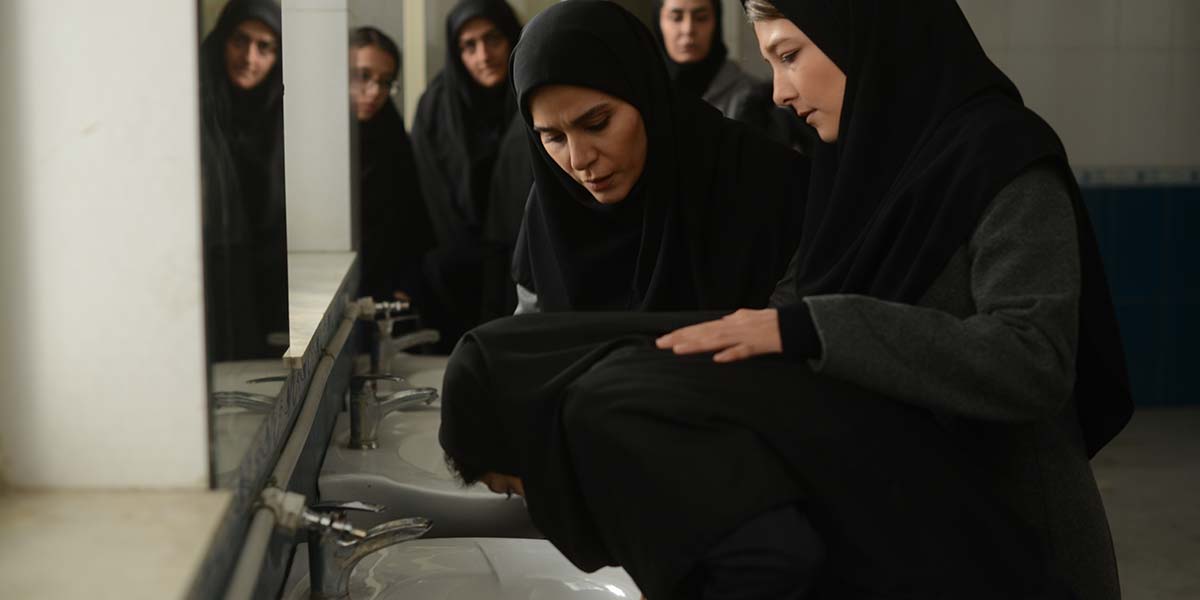The last day of press screenings before the BFI London Film Festival opens, Tuesday October 6th brings us frights, love, guilt, lies and tragedy, with Australian horror, Queer Kenyan documentary, Angola-American drama and Iranian melodrama.
Relic
Australian cinema has delivered a few of the most effectively terrifying, yet also moving and emotional horror films of recent years, with works such as The Babadook and Lake Mungo. The debut of director Natalie Erika James continues in a similar tradition, combining slow-burning chills which build to nerve-shredding climaxes, with a touching and unnerving exploration of aging and generational guilt.
The film follows Kay (Emily Mortimer) and her grown-up daughter Sam (Bella Heathcote) as they travel to the country to follow up on calls from concerned neighbours that her elderly mother (Robyn Nevin) has not been seen lately. They arrive to find the house deserted, yet filled with sinister shifting sounds, covered in post-it notes, and with something softly breathing in the closet. Among the typical kind of helpful reminders someone with dementia might leave for themselves, “flush”, “take pills”, are more ominous warnings, like “don’t follow it”. As the pair take up temporary residence in the mouldy old house, and ornery Grandmother returns from her unexplained absence, Kay begins to have haunting dreams of the ancestor left to lose his mind and die alone in a cabin in the neighbouring woods.
Relic plays with familiar tropes but never pushes them too far to the point where they feel stale or generic, and always ties them to very grounded and recognisable feelings of discomfort and revulsion at aging, as well as a sense of guilt at this very reaction. The film is tapping into an almost zombie-like terror of a loved one slipping away, to be replaced by a frightening, malevolent shell that mocks the power its familiar appearance has over you. It’s in this perfect balance between skin-crawling and even pulse-racing fright and the deeper resonances of its themes that Relic’s spark of genius is found. It doesn’t fall into lazy one to one allegorising, but nor does it ever come unstuck from relatable senses and deep-seated feelings.
Relic certainly falls on the smarter and more emotive end of the horror spectrum, but it nonetheless manages to produce some effectively nightmarish sequences out of very simple components. James’s directing is phenomenally confident and accomplished for a feature debut and the three leads all give effective portrayals. Heathcote gives a suitably intense expression of terror and Nevin does an excellent job at suggesting the poignancy of the strong, independent mind slowly slipping away.
Farewell Amor
The only one of the four films screened today to push beyond an hour and a half in length, with Farewell Amor, director Ekwa Msangi expands upon her own earlier short film Farewell Meu Amor. Like the earlier project, Farewell Amor follows the events that unfold when Angolan immigrant Walter (Ntare Gurna Mbaho Mwine–Queen of Katwe, Blood Diamond) is joined in the United States by his wife Esther (Zainab Jah–Dinner Rush) and daughter Sylvia (Jayme Lawson, in her feature debut role) after seventeen years apart. Walter went ahead to establish a life for the three after the Angolan war and Sylvia was born, so all three have become very different people since they were last together. Esther has abandoned her carefree youth and fiercely devoted herself to her Christianity and Sylvia is a grown woman now, though her mother does not treat her so.
The film is broken into three segments, each one retelling the first weeks of their reunion and adjustment to a new life together in America from a different key character’s perspective. Sylvia struggles to fit into her new school environment, using dance as an outlet, while Walter is dealing with having forced himself to give up the new life he has secretly been forging with another woman. This is, in turn, something that has not gone unnoticed by Esther, who yearns to win back her husband’s desire and affections.
Music and dance are core themes in the film, expressing not only the cultural importance of Sylvia’s Kuduro music as a link to her self-expression and the home and friends she has left but also personal importance, as the thing that first brought Walter and Esther together. Several key moments in the film are expressed through dance, as Sylvia prepares for a local dance cypher and characters are brought together or bid farewell on the dance floor.
As a result of the expansion from short to feature-length, the title, Farewell Amor, is perhaps less fitting than it was for the short. It reads more ironically in this version, as the film tells the story less of a family and love lost than one being tentatively rediscovered. As with Relic, all three leads give sterling and utterly convincing performances, acutely expressing the emotional situations of the characters they play. Jayme Lawson, in particular, is a stunning discovery and has already been cast opposite Robert Pattinson in the forthcoming (someday) The Batman.
Though an often reserved and undemonstrative film, particularly compared to a similarly themed work, such as Jacques Audiard’s Dheepan, Farewell Amor intimately tells a moving and personal story of renewal and paints an entirely positive picture of cultural integration.
I Am Samuel
A revealing and deeply humane documentary from director Pete Murimi, I Am Samuel is the public testament of the titular character, a gay man living with his loving partner Alex in Nairobi. Expressed in frank and simple terms by the couple at the film’s centre, and the film crew following their lives, I Am Samuel follows the complexity of maintaining a committed romantic relationship which is so frowned upon by one’s own environment and even family. The film principally explores the relationship between Samuel and his parents, during his and Alex’s visits to their farm in the country.
In the film’s opening moments, the beauty of Samuel and Alex’s love is juxtaposed harshly against the brutality with which their society treats anyone who expresses such feelings. In Kenya, homosexuality is punishable by a fourteen-year prison sentence, not to mention the constant threat of beating and other hate crimes, which the documentary depicts unflinchingly.
I Am Samuel effectively explores the duality of romantic self-expression under an oppressive social regime, of the truths understood but the lies embraced: Samuel’s parents are in the process of building a farmhouse for him to live in should he move back to the country with his family. In the city residence where Samuel and Alex live with another couple, their windows are blocked out to hide the rainbow pride flag they have hung on their wall. The film is full of tangible expressions of their situation, yet the film’s short run times still leaves other arenas unexplored. Director Murimi is present in the film, interacting and querying from behind the camera, but there are questions that still feel unanswered. Samuel has a daughter, whom we see, but from whom we hear nothing, and whose mother is never even acknowledged.
Despite the restrictions of spontaneity and documentary, however, I Am Samuel is nonetheless a touching, poignant and often deeply moving paean to the indomitability of true love.
180 Degree Rule
The last film of the day came in the form of tragic Iranian melodrama 180 Degree Rule. Although the film is named for the convention in cinema that you oughtn’t ever cut between two shots more than 180 degrees off from one another, in order to keep the perspective coherent, there was little of this sort of cinematic playfulness or experimentation in the film itself. The great majority of Iranian cinematic exports take the form of cultural or societal commentary or critiques of patriarchal structures. Instead, 180 Degree Rule touches on these issues only indirectly and discreetly. Instead, what director Farnoosh Samadi presents viewers, again with her feature-length debut, is a simple tragedy, exploring guilt, lies and grief in a crushingly direct manner.
The film begins with wife and mother Sara arguing with her unpleasant and uncommunicative husband Hamed over whether they should attend her sister’s wedding. When Hamed is called away on business, Sara defies his insistence that they remain at home, however, when a freak accident occurs at the wedding, Sara is crushed by guilt and convinces her grief-stricken family to fabricate a lie with her.
Unlike many viewers I have found, I had no issues with the script or the story. The characters most certainly behave irrationally, but do so in a situation where rationality is an impossibility. Instead, the film explores the causes and consequences of this irrationality, and as frustrating as it may be to witness, it would be more rewarding to consider what might be motivating such obviously poor decision-making, rather than merely opining that you wouldn’t have done that in her situation.

My issues with the film are more on an ideological perspective than a technical one. I believe the film is presenting hints of a more effectively critical window on patriarchal Iranian culture and the way it breeds internalised shame, guilt and institutional silence. However, in this respect, despite the phenomenal central performance from Sahar Dolatshahi, 180 Degree Rule failed to meet the mark for me. It was certainly a distressing and effectively bleak experience, but I struggled to pull a rewarding thematic statement from its far fetched premise, and the viewing experience was marred by some very poor subtitling.
The London Film Festival Opens on Wednesday 7th with public, in-person screenings of Steve McQueen’s historical drama Mangrove in London, and virtual screenings on BFI Player of The Disciple, Stray and Miranda July’s Kajillionaire.



